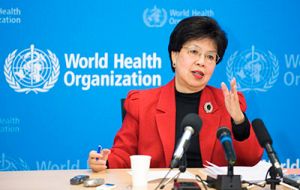MercoPress. South Atlantic News Agency
WHO calls for urgent action to reduce burden of non communicable diseases
 “The global community has the chance to change the course of the NCD epidemic,” says WHO Director-General Dr Margaret Chan
“The global community has the chance to change the course of the NCD epidemic,” says WHO Director-General Dr Margaret Chan Urgent government action is needed to meet global targets to reduce the burden of non-communicable diseases (NCDs), and prevent the annual toll of 16 million people dying prematurely—before the age of 70 – from heart and lung diseases, stroke, cancer and diabetes, according to a new World Health Organization report.
“The global community has the chance to change the course of the NCD epidemic,” says WHO Director-General Dr Margaret Chan, who this Monday launched the “Global status report on non-communicable diseases 2014”.
“By investing just US$1-3 dollars per person per year, countries can dramatically reduce illness and death from NCDs. In 2015, every country needs to set national targets and implement cost-effective actions. If they do not, millions of lives will continue to be lost too soon.”
The report states that most premature NCD deaths are preventable. Of the 38 million lives lost to NCDs in 2012, 16 million or 42% were premature and avoidable – up from 14.6 million in 2000. Nearly five years into the global effort to reduce premature deaths from NCDs by 25% by 2025, the report provides a fresh perspective on key lessons learned.
Premature NCD deaths can be significantly reduced through government policies reducing tobacco use, harmful use of alcohol, unhealthy diets and physical inactivity, and delivering universal health care. For example, in Brazil the NCD mortality rate is dropping 1.8% per year due in part to the expansion of primary health care.
But the report calls for more action to be taken to curb the epidemic, particularly in low- and middle-income countries, where deaths due to NCDs are overtaking those from infectious diseases. Almost three quarters of all NCD deaths (28 million), and 82% of the 16 million premature deaths, occur in low- and middle-income countries.
“Best buys” to reduce the burden
The WHO report provides the baseline for monitoring implementation of the Global action plan for NCDs 2013-2020, aimed at reducing the number of premature deaths from NCDs by 25% by 2025. Outlined in the action plan are nine voluntary global targets that address key NCD risk factors including tobacco use, salt intake, physical inactivity, high blood pressure and harmful use of alcohol.
“Our world possesses the knowledge and resources to achieve the nine global NCD targets by 2025,” says Dr Oleg Chestnov, WHO’s Assistant Director-General for Non-communicable Diseases and Mental Health. “Falling short of the targets would be unacceptable. If we miss this opportunity to set national targets in 2015 and work towards attaining our promises in 2025, we will have failed to address one of the major challenges for development in the 21st century.”
The report provides “best buy” or cost-effective, high-impact interventions recommended by WHO, including banning all forms of tobacco advertising, replacing trans fats with polyunsaturated fats, restricting or banning alcohol advertising, preventing heart attacks and strokes, promoting breastfeeding, implementing public awareness programs on diet and physical activity, and preventing cervical cancer through screening. Many countries have already had success in implementing these interventions to meet global targets.
Examples of regional and country “best buy” successes listed in the report:
• Turkey was the first country to implement all the “best-buy” measures for tobacco reduction. In 2012, the country increased the size of health-warning labels to cover 65% of the total surface area of each tobacco product. Tobacco taxes now make up 80% of the total retail price, and there is currently a total ban on tobacco advertising, promotion and sponsorship nationwide. As a result, the country saw a 13.4% relative decline in smoking rates from 2008 to 2012.
• Hungary passed a law to tax food and drink components with a high risk for health, such as sugar, salt and caffeine. A year later, 40% of manufacturers changed their product formula to reduce the taxable ingredients, sales decreased 27% and people consumed 25-35% fewer products.
• Argentina, Brazil, Chile, Canada, Mexico and the USA have promoted salt reduction in packaged foods and bread. Argentina has already achieved a 25% reduction in the salt content of bread.




Top Comments
Disclaimer & comment rules-

Read all commentsAlthough I do recognise the seriousness of this report, it is rather fun, (and makes a lot of sense), if you replace Populism/Peronism for NCD.
Jan 21st, 2015 - 01:45 am 0I'll go first...
“ “The global community has the chance to change the course of the Populism/Peronism epidemic,” says WHO Director-General Dr Margaret Chan.
”Premature Populism/Peronism deaths can be significantly reduced through government policies reducing tobacco use, harmful use of alcohol, unhealthy diets and physical inactivity, [including dependency on State hand-outs in return for votes]“.
”But the report calls for more action to be taken to curb the epidemic, particularly in low- and middle-income countries, where deaths due to Populism/Peronism are overtaking those from infectious diseases. ”
over to you guys.....
;-)
Commenting for this story is now closed.
If you have a Facebook account, become a fan and comment on our Facebook Page!